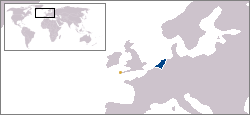Three Hundred and Thirty Five Years' War facts for kids
Quick facts for kids Three Hundred and Thirty Five Years' War |
|||||||
|---|---|---|---|---|---|---|---|
 Isles of Scilly Republic of the Seven United Netherlands |
|||||||
|
|||||||
| Belligerents | |||||||
| Commanders and leaders | |||||||
| Casualties and losses | |||||||
| None | None | ||||||
The Three Hundred and Thirty Five Years' War is a very unusual story. It's said to have been a war between the Netherlands and the Isles of Scilly. The Isles of Scilly are small islands off the coast of Great Britain.
What makes this "war" so strange? It supposedly lasted for 335 years without a single battle or shot fired! This would make it one of the longest and most peaceful wars ever. People even argue if it was a real war at all. However, peace was officially declared in 1986, just in case!
Contents
The 335 Years' War: A Strange Story
How the "War" Began
This unusual story started during the English Civil War. This was a big fight in England between the Royalists (who supported the King) and the Parliamentarians (who supported Parliament). The war lasted from 1642 to 1651.
By 1648, the Parliamentarian leader, Oliver Cromwell, had pushed the Royalists back. The last Royalist stronghold on the mainland was Cornwall. The Royalist Navy had to escape to the Isles of Scilly. These islands were owned by a Royalist named John Granville.
The Dutch Get Involved
At this time, the navy of the United Provinces of the Netherlands was friends with the Parliamentarians. The Dutch had received help from England during their own war for independence, the Eighty Years' War. That war ended in 1648.
The Dutch wanted to stay allies with England. They chose to support the Parliamentarians, as they seemed likely to win the Civil War.
However, the Royalist ships based in Scilly were attacking Dutch merchant ships. These attacks caused a lot of damage and losses for the Dutch.
On March 30, 1651, a Dutch admiral named Maarten Harpertszoon Tromp sailed to Scilly. He demanded that the Royalists pay for the Dutch ships and goods they had taken.
A letter from April 17, 1651, says that Tromp went to Pendennis Castle. He explained that he had visited Scilly to demand payment. Since he didn't get a good answer, he "declared war on them." Because most of England was controlled by Parliament, the war was declared only on the Isles of Scilly.
Royalists Give Up
Soon after this "declaration of war," in June 1651, Parliamentarian forces arrived. Their admiral, Robert Blake, made the Royalist fleet surrender.
The Dutch fleet was no longer in danger. They left the area without ever firing a single shot. Because declaring war on a small part of another country was so unusual, the Dutch never officially declared peace.
Peace at Last!
For many years, people on the Isles of Scilly had a local story. They believed that the "war" was still going on.
In 1986, a historian named Roy Duncan decided to check this story. He was also the Chairman of the Isles of Scilly Council. He wrote to the Dutch Embassy in London.
The embassy staff looked into it and found no peace treaty had ever been signed! So, Duncan invited the Dutch ambassador, Rein Huydecoper, to visit the islands. They officially ended the "conflict" on April 17, 1986. This was 335 years after the supposed war began. The Dutch ambassador even joked that it must have been scary for the people of Scilly "to know we could have attacked at any moment."
Was It a Real War?
Many historians and experts debate if this war was truly real.
One historian, Bowley (2001), thinks the letter about Tromp "declaring war" might be the start of the legend. He argues that Tromp likely didn't have permission from his government to declare war. He was probably just trying to get the Royalists to pay for the damage they caused. Even if a war had started, it would have been settled by 1654. This was when England and the Netherlands signed a treaty after the First Dutch War.
Graeme Donald, in his book Loose Cannons, also doubts the war's existence. He says that neither side was truly a separate nation. Tromp was an admiral, not a country. And Scilly was part of England. He believes the story was a great way to get attention for the islands' tourism.
See also
- List of wars extended by diplomatic irregularity
- Arauco War (1536–1881), another example of a very long war
- Anglo–Zanzibar War, generally considered the world's shortest war

